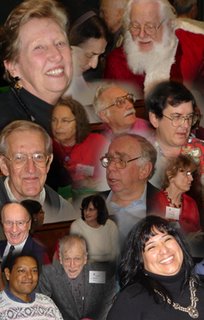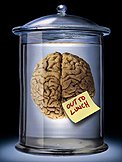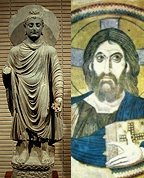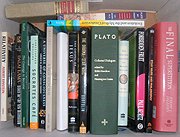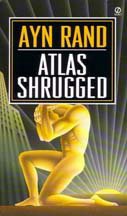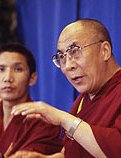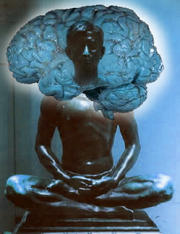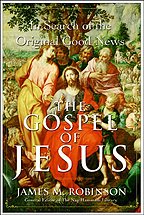I was just reading on
www.prototista.org about the
concept of autopoiesis. I've written here about
complex systems quite a bit, and as most would know,
all life forms are complex systems, but obviously, not
all complex systems are life in the conventional
understanding of the word. So what makes come complex
systems "life" while others are not?
Autopoiesis is a trait that some complex systems have
(but not all), whereby they are constantly remaking
themselves. They take in new material and use that to
rebuild themselves as they function so that, over
time, they are made up of completely new matter, and
yet the pattern, form, and function has remained
consistent.
This seems like a wonderful way to parse out which
complex systems are life and which are not. It
obviously includes all living things.
The problem is that it also includes things like the
red spot on Jupiter, which has been around far longer
than the time any one particle of gas has spent within
it. It also might be said to include corporations,
which are constantly changing out individual workers,
buildings, etc. but maintain their organizational form
and function.
Furthermore, it includes the entire planet earth - and
not just the life forms or ecology of planet earth,
but all of the non-biological material, from
volcanoes, to weather, all interacting in one complete
system.
Many would take this as a failure of the endeavor to
use autopoiesis as a definitional marker of life.
However, there are many who seem undaunted and
maintain the integrity of the definition. As I will
explain, I remain uncertain about this.
These folks say that we might be more accurate in
seeing that the earth and other autopoiesetic complex
systems really are examples of life, even if different
from purely biological life. They maintain that there
can be great advantages to seeing life in this manner.
Unfortunately, this concept (called Gaia when
referring to the earth as a life form) has been
misrepresented by many New Age groups who take it to
mean there's some vital life force of 'mother earth'
and so on.
When I pointed out to my wife how the processes of the
earth and those of a life form are identical in a
complex systems sense, both being autopoiesetic, she
simply said, "I don't like that". I asked her why and
what the difference was and she couldn't say. She
just said, "I don't know but I don't like it".
I think we all have a sense that lizards and people
and cats and trees are alive and rocks and clouds and
rivers are not. It seems like it's almost self
evident and there's something extremely intuitive
about it. So much so that we figure there MUST be
some rational and logical formula that should clearly
delineate why one is alive and the other not.
But that got me thinking, is it really self evident?
Is it really intuitive or obvious even? Or, might the
difference between what is alive and what is not
simply be a cultural convention?
As the biological sciences developed, it seems we've
been told since elementary school that x is alive and
y is not. That's a very early viewpoint that's
explained to kids if memory serves. But in many
primal cultures, the idea of other moving systems
being alive (or perhaps they might say, being infused
with spirits) seems commonsensical and intuitive to
them. While I don't believe in spirits and vital life
"forces", the fact that these cultures saw such
systems as intuitively alive makes me question our own
intuitions in that regard; especially now that
complexity science is having trouble finding real
concretely measurable validation of our conceptions.
Maybe the only reason we "don't like" the idea of
other autopoiesetic complex systems being alive is
simply due to an ingrained cultural predisposition
concerning what is thought to be alive and what isn't.
As I said, I am a strict materialist with no notions
of spirits, souls, the supernatural, or even natural
vitalism (life forces). But when we look at life as a
process of Complexity involving natural elements
interacting according to natural laws, it is a
two-sided proposition, for it inherently begs the
question of why other such systems are NOT to be
considered alive. Maybe they should?
 I've been reading a textbook I have on the history of religion, as well as a number of Buddhist websites and Wikipedia articles, trying to understand the historic relationships between the various Buddhist schools. I made this chart in an effort to work out what I was reading (click on it to enlarge, then hit your 'back' button to return). However, I have no idea how accurate it is, so please take it with a grain of salt. I am also posting a reference to this page on the www.comparative-religion.com forums (in the Buddhist forum of course). Click here to see that forum page. Hopefully folks there can tell me if my chart is accurate. If not, I'll probably correct by editing this post.
I've been reading a textbook I have on the history of religion, as well as a number of Buddhist websites and Wikipedia articles, trying to understand the historic relationships between the various Buddhist schools. I made this chart in an effort to work out what I was reading (click on it to enlarge, then hit your 'back' button to return). However, I have no idea how accurate it is, so please take it with a grain of salt. I am also posting a reference to this page on the www.comparative-religion.com forums (in the Buddhist forum of course). Click here to see that forum page. Hopefully folks there can tell me if my chart is accurate. If not, I'll probably correct by editing this post.
